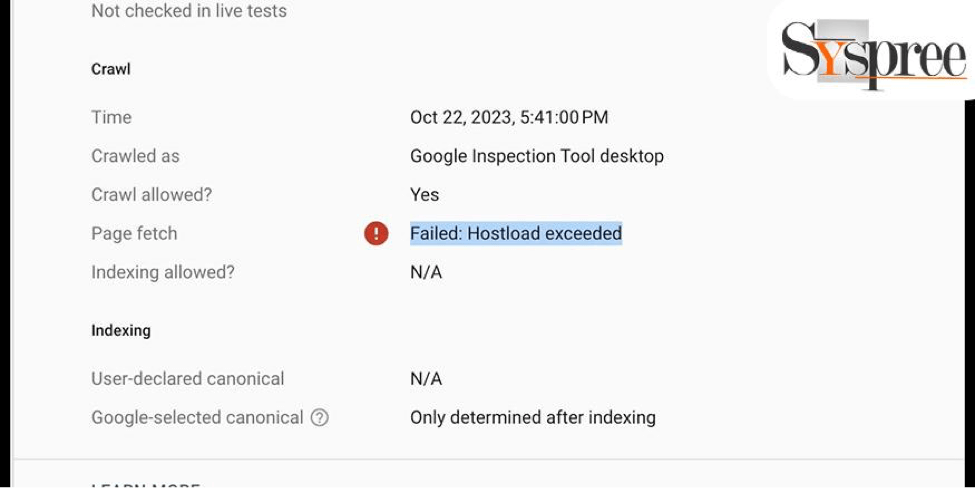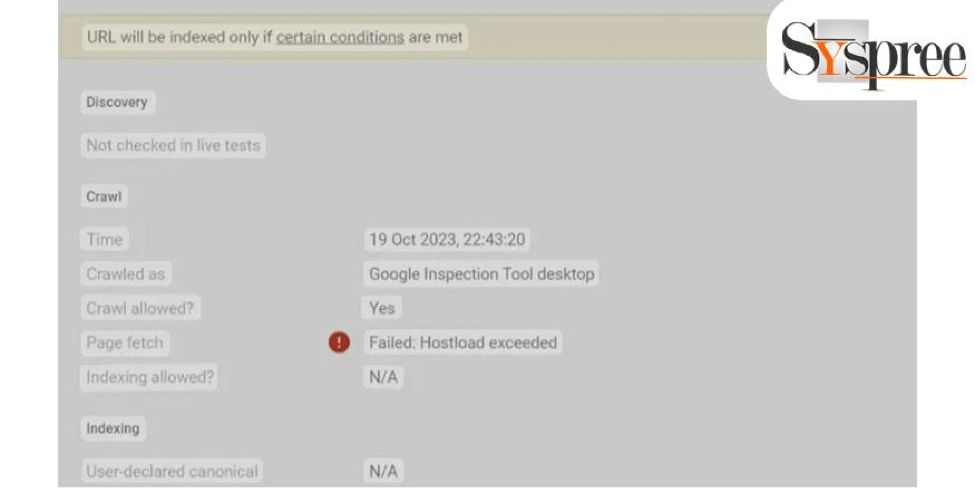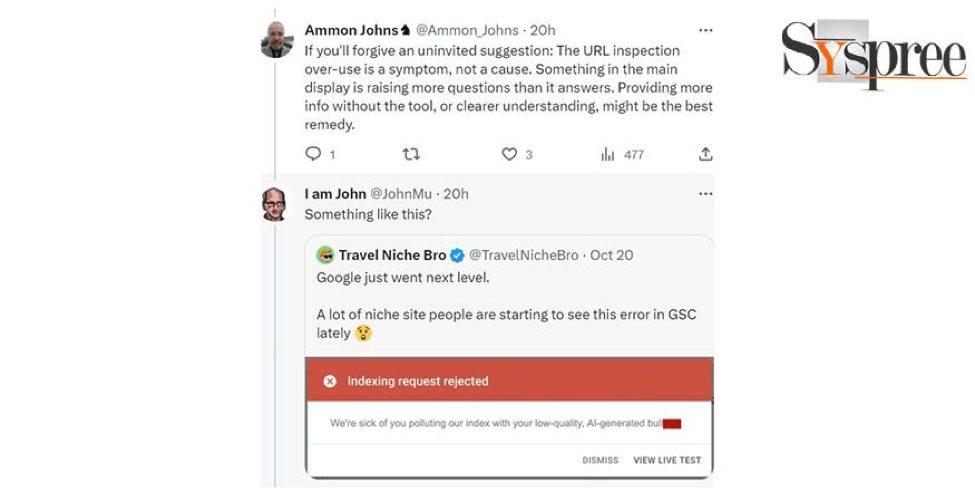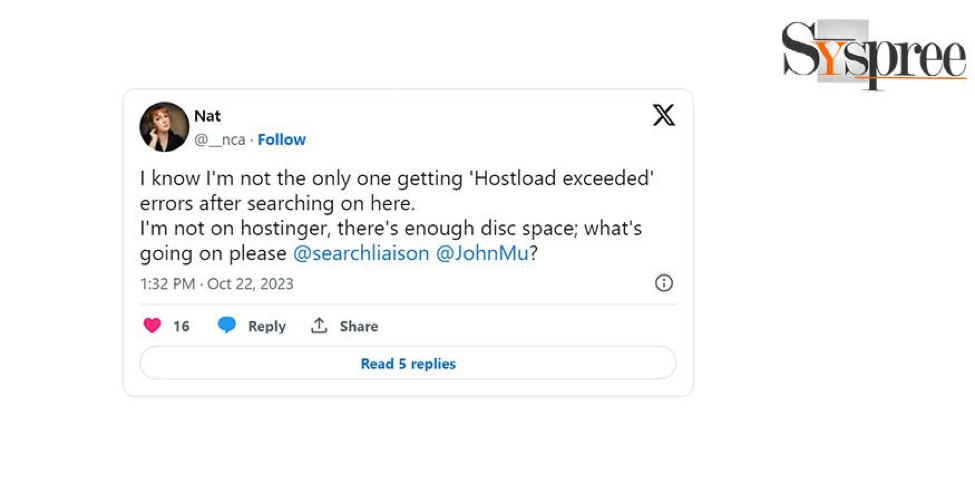The web is filled with mystery, and one recently discovered mystery that has caused publishers and webmasters to scratch at their desks was an obscure error message that reads: “Hostload Exceeded.” The mystery is related to the search console of Google Search Console and its seemingly inexplicably slow indexing of URLs submitted.
Table of Contents
Key Takeaways:
- The “Hostload Exceeded” mystery left publishers and webmasters puzzled by a confusing error message that affected the Google Search Console and URL indexing.
- Initial theories suggested hosting providers on the web as the cause of the problem. However, investigation revealed that it wasn’t directly connected to hosting services.
- Various reports from hosting firms, such as Namecheap, DRWebhost, and Hostinger, revealed that the issue was widespread, proving that it was exclusive to a few hosting providers.
- Despite the efforts of hosting providers to solve issues, it was obvious that the problem wasn’t a result of hosting providers, which led to the issue of the source.
The “Hostload Exceeded” Mystery
The issue first surfaced on the weekend, and a flurry of confusion swept through administrators and owners of websites. Initial theories suggested the cause of the issue, and many believed that the root of the issue lay within the control of the web host service providers. However, investigations quickly showed that the issue wasn’t directly due to web hosting providers and putting the blame squarely on Google.
Initial Speculations

Interestingly, reports started flooding in from a variety of hosting companies. It was noticed that even sites hosted on well-known platforms such as Namecheap, Indian host DRWebhost, and Hostinger were hit with a “Hostload Exceeded” problem. The leading SEO company in Mumbai says that Hostinger’s proactive response was to issue an incident report acknowledging the increasing number of mistakes in indexing websites. Their dedication to solving the issue was apparent since they informed their users they were working hard to find solutions.
Despite all this effort, however, the general sentiment of Search Console users persisted – the issue was not resolved. It became increasingly apparent that the issue went beyond the borders of one web hosting service. It was a surprise when it became clear that the issue wasn’t related to issues with crawling or bandwidth on the part of web hosts. Every webmaster who faced this mystery could confidently state that the issue didn’t originate from their hosting service.
Hostload Exceeded Issue Not A Web Host Problem
While the “Hostload Exceeded” issue continued to confuse webmasters and publishers, an important change in the technology shed light on the nature of the issue. It wasn’t a web hosting problem. Information from different web hosting companies, ranging from Namecheap to DRWebhost and Hostinger, revealed the wide and varied nature of the issue. This has disproved the original idea that the issue was restricted to specific hosting services.
Reports from Different Web Hosts
The experts from the leading SEO company in Mumbai say that the webmasters who hosted on different platforms noticed a “Hostload Exceeded” problem, leading to an investigation to determine if the problem could be traced to a specific hosting service. Namecheap users voiced their displeasure, as did those hosted by Indian web hosting provider DRWebhost. The wide range of hosting companies affected quickly dispelled any notion that this was a unique issue limited to one server or company.
Hostinger’s Incident Report
One hosting service that gained attention in the wake of this scandal was Hostinger. In recognition of the growing number of issues with indexing websites through Google Search Console, Hostinger issued an incident report to keep customers updated. The company acknowledged the issue and assured users they were trying to find a solution.
Hostinger’s proactive approach to addressing the issue revealed their commitment to providing a seamless experience for their customers. The subsequent update confirmed that they had found the issue’s root and fixed it. However, this didn’t conclude this “Hostload Exceeded” problem since many Search Console users struggled with the same issue.
Confirmation of Web Hosts Not to Blame
Despite the number of web hosts affected and subsequent efforts to fix the issue, it was evident that the root of the problem was not a result of hosting service providers. Webmasters who faced an issue with “Hostload Exceeded” unanimously confirmed that the issue did not originate from the hosting company’s part.
This discovery led to whether the issue was separate from web hosting. What could be the cause of this mysterious issue? The digital community scoured for answers, the attention turned toward Google webmasters, and the Google Support Center sought to unravel the mystery.
Google Support Pages Flooded with Indexing Failure Reports

The best SEO company says that while the “Hostload Exceeded” mystery deepened, webmasters and owners of websites looking for answers flocked toward the Google Support Center, hoping for clarification on this confusing problem. The flood of users looking for assistance is a sign of the apprehension and confusion caused by the mysterious “Hostload Exceeded” message that had been created.
User Surge Seeking Help
The Google Support Center experienced an unprecedented number of people seeking assistance with a “Hostload Exceeded” error. The flood of questions overwhelmed support channels, and webmasters scrambled for advice on solving the problem. For many webmasters, this urgent issue was exacerbated by the reality that their sites were rendered inaccessible to search engines, hampering their online visibility.
Digital marketers and website owners who depend on Google’s indexing service to help promote their websites and drive traffic to their websites were in uncertain status. The “Hostload Exceeded” issue disrupted their ability to upload new URLs or even update their existing ones, halting their marketing efforts online. In the search for solutions, many resorted to Google’s support site in hopes of a quick solution to this tangled issue.
Support Center Overwhelmed
The flood of people seeking assistance presented a major obstacle for the Google Support Center. The volume of inquiries about the “Hostload Exceeded” error was overwhelming. To grasp the big issue, you can search for “hostload exceeded” on Google’s support portal. It resulted in an astonishing amount of almost 40 requests for help in only one week.
The challenge for Google’s support personnel was not just to respond to the issues promptly but also to provide complete and complete explanations of the problem. The incident was an unforgiving reminder of the vital importance of the Google Search Console in the digital world and the impact that a technical glitch can have on websites and even online businesses.
The Support Center was inundated with “Hostload Exceeded” queries, and webmasters waited with bated breath for the resolution and return to normal indexing as they hoped for more clarity from Google about the root cause of this confusing issue.
Google’s Explanation
The experts from the best SEO company say that the obscure “Hostload Exceeded” issue that puzzled webmasters and caused Google’s Support Center to be flooded with inquiries finally came to clarity when Google’s individual, John Mueller, entered the discussion as Google’s Webmaster Trends Analyst John Mueller is often looked for information on the inner workings of Google’s search algorithms. In this instance, he offered an insightful perspective.
John Mueller’s Entry
Amid the confusion about this “Hostload Exceeded” issue, one person was concerned and decided to use Twitter for help, tweeting “, Anyone experiencing issues with the error “Hostload Exceeded” within Google Webmaster? What can I do to fix this problem?” This tweet caught John Mueller’s eye and spurred him to comment.
In reply to the user’s inquiry, John Mueller offered a calm message, saying, “I wouldn’t worry about it – normal crawling and indexing is generally fine.” The first sign was that there was not any major issue regarding Google’s indexing process. But webmasters were seeking more details and a better understanding of the issues.
Insights into the Issue

John Mueller’s initial statement was sufficient to soothe the anxieties of a few webmasters concerned about the effect of the “Hostload Exceeded” on their sites “Hostload Exceeded” issue on their websites.
The leading digital marketing company says that but a need for greater transparency remained, particularly for those who’d seen their websites being hit by this indexing issue. In response to the request for more information from a user whose name was Ammon, John Mueller retweeted another user’s tweet, which indicated that the problem was only affecting low-quality websites.
Mueller’s Tweet
In his tweet, Mueller indicated that the issue could be related to website content quality or URLs submitted. This led to an interesting possibility of discussion since it suggested an explanation for it could be that the “Hostload Exceeded” issue might be due to the type of content that is being indexed. But it’s important to remember this: John Mueller didn’t explicitly state that it was due to quality; however, he made it clear that the error wasn’t affecting every website equally.
Ammon Johns, unhappy with the transparency level, was tweeting again, suggesting that if there wasn’t something to be concerned about, it ought to have been something Google could address. He also emphasized the importance of transparency, something many internet users wanted.
Response to this Plea by Mueller
In response to the request for clarity, Mueller clarified further, saying, “People are spamming the Inspect URL / Submit to Indexing tool – normal indexing works fine.” This remark suggested an underlying cause for this “Hostload Exceeded” issue. According to Mueller, this issue could be due to site owners and webmasters using the indexing tool by sending numerous URLs to be indexed. In essence, the requests of specific users could overload Google’s system.
Furthermore, John Mueller advised webmasters to stay clear of excessive use of the “Inspect URL” and avoid excessive use of the “Inspect URL” tool. He advised that indexing and crawling happen naturally. It is generally accepted that Google will typically only accept requests to index if it finds problems with the quality of content or if there are excessive submissions from one source.
Although the mystery surrounding “Hostload Exceeded” was not fully resolved, the “Hostload Exceeded” issue was not completely solved. John Mueller’s insight gave the needed clarity and directed webmasters towards the correct direction. The issue could be more in the way webmasters used Google’s indexing tools rather than a problem with Google’s indexing system.
When webmasters redesigned their strategies and stayed clear of overly-submitted submissions, the expectation was that the baffling “Hostload Exceeded” error would gradually disappear into the past, allowing websites to take back their position in the digital world.
Quality vs. Quantity: Striking the Balance in Indexing
The constant battle between quantity and quality is a well-known topic in the ever-changing realm of search engine optimization (SEO) and indexing websites. But, the controversy was recently rekindled within the context of “Hostload Exceeded,” issue that left webmasters and digital marketers battling many indexing problems.
A Tweet Sparks Discussion

The trigger for this new discussion was a tweet that wanted to know the answer to “Hostload Exceeded” error “Hostload Exceeded” error in Google Webmaster. The tweet that was in question demanded, “Anyone else having problems with the ‘Hostload Exceeded’ error in Google Webmaster? How to solve this issue?” The simple question caught the interest of Google’s Webmaster Trends Analyst John Mueller and kick-started an argument that was heard throughout the internet community.
Explanations by John Mueller
John Mueller’s initial reaction to the Twitter post was positive. He said, “I wouldn’t worry about it – normal crawling and indexing is generally fine.” The initial statement suggested that there was not any major issue in Google’s indexing system. For many webmasters and website owners, it was pleasant information since it indicated that their sites still needed to be completely removed from the search results.
Evidently, the internet community needed more clarity on this “Hostload Exceeded” issue. In response to an inquiry for more details by a user named Ammon, John Mueller retweeted a tweet from another user suggesting that the problem afflicted only low-quality sites. This led to a new avenue of discussion, which pointed to an underlying reason: the quality of the URLs being sent.
Mueller’s indirect mention of quality has sparked interest among marketers and webmasters. Although he didn’t explicitly say that quality was the problem, the message was evident – the issue affected only some websites equally. It suggested a complex problem that could be traced back to the quality of content and other elements.
The Role of Quality in Indexing
The debate around the “Hostload Exceeded” issue illuminated an important aspect of indexing: the importance of quality. While quantity is certainly a factor in the speed of indexing and efficiency, the quality of the information and submitted URLs also play a significant part.
The experts from the leading digital marketing company say that quality is a broad term that covers a variety of factors that include the relevancy, uniqueness, and authenticity of the information. Google’s algorithms are created to rank content that will provide the most value to its users. This is the reason they are selective when it comes to what they index.
John Mueller’s tweets suggested that the “Hostload Exceeded” error might be due to webmasters or site owners who submitted too many URLs or other content that did not conform to Google’s standards for quality. This aligned with the belief that Google’s indexing algorithm was created to provide users with the highest quality search results. The system’s overload with unprofessional or unrelated content could undermine the goal.
Conclusion
The “Hostload Exceeded” issue highlighted the importance of balancing quality and quantity regarding website search engine optimization and indexing. Information from John Mueller hinted that content quality, not quantity, could have been a major element in the controversy. This argument reinforces the idea that, when it comes to SEO, quality must take priority, making sure that websites provide quality and relevant content to customers. If you like this blog check out our previous blog Bing Explains How to Perform SEO for AI Search

Its a very valuable information thank you for sharing this insight
I completely agree with this blog. It’s crucial to focus on the quality of the content rather than just trying to generate a large quantity of it. Providing valuable and relevant information to customers is what will ultimately benefit your website’s SEO and indexing. The “Hostload Exceeded” issue serves as a reminder that it’s important to find the right balance between quality and quantity to ensure the best possible user experience.
We are pleased to know you found the blog useful and informative